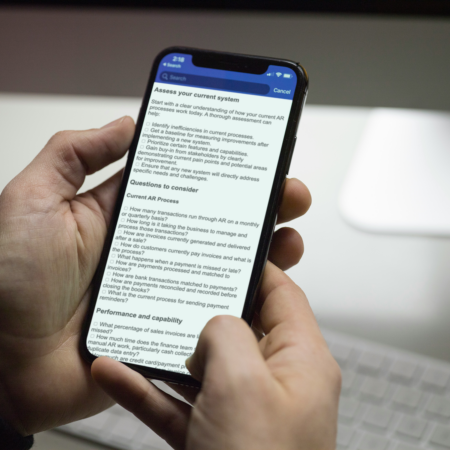
After all, a manual accounting system (or the wrong accounting software for small businesses) can create extra work and costly mistakes. The right accounting software can make the process more efficient and help you generate reports — so you can make more accurate business assessments.
But with so many options on the market, it can be challenging to choose the right platform. If you’ve been asking, “Do I need accounting software for my small business?” then you’re in the right place. Let’s take a look at the signs you might need to make the switch to accounting software for your company.
Newsletter sign up
"*" indicates required fields
Do I Need Accounting Software for My Small Business?
10 Signs the Answer is Yes
There are a few clear signs that you’re ready to switch to an accounting software system. If you spend too much time on manual tasks, waste time on frequent switching between tools, and dread the time burden of tax season, it is time to consider an accounting solution.
Let’s take a look at the top ten signals that you need accounting software for your small business.
1. Too Many Hours Spent on Manual Tasks
Bookkeeping can take a significant amount of time, especially with a manual system. If you use double-entry bookkeeping, you may find yourself performing the same tasks repeatedly in a seemingly endless loop. Accounting software can automate those repetitive tasks, letting you reinvest that time in more important business initiatives.
Accounting for inventory is another labor-intensive manual process that the right accounting program can simplify. If you spend hours inputting data, switching to accounting software can automate inventory management to free up your busy schedule for other vital work.
Pro Tip: Try tracking the time spent on manual accounting tasks for two weeks. If you spend more than 5 hours on data entry and repeated jobs, you may need accounting software for your small business.
2. You Switch Frequently Between Accounting Tools
Without the right accounting software, you may work with several different tools to manage your finances. You might use a dedicated tool for payroll and a spreadsheet for tracking projects, plus a Customer Relationship Management system (CRM) and a manual inventory tracking system.
Not only does switching between different tools and systems create unnecessary confusion, but it’s also not efficient. You can streamline your accounting process by switching to accounting software that integrates all the different aspects of your workflows into one, seamless solution.
3. Tax Time is a Scramble
With a manual accounting system, you may let tracking and reporting tasks pile up. Then during tax time, you face a daunting stack of data to input into your ledger. The time it takes to prepare your files for taxes can be overwhelming. Worse, doing it all at the last minute can lead to mistakes that can increase your tax burden.
The right accounting software can automate your data entry, transforming tax time into a quick and painless process. If you’re still wondering, “Why does my small business need accounting software,” the amount of time and stress you experience at tax time can be your answer.
Click here to learn more about how Accounting Seed can help with tax accounting.
4. The Number of Transactions Has Increased
As your business gets busier, so does your ledger. Manually tracking data can be overwhelming when you add more clients and projects. In fact, even if you use accounting software now, you may exceed its transaction limit, since many programs limit you to 10,000 to 15,000 transactions per year.
Waiting until there’s a problem with your manual or free accounting system can cost massive amounts of time and money as you struggle to upgrade during an expansion. It’s best to tackle the learning curve before your existing accounting setup starts to fail.
5. Existing Software is Slow or Lags
Maybe you’re using a basic software solution because of a shoestring budget. At first, you accepted a little lag time when navigating from one screen to another because your accounting system was simple and sales were relatively light.
But now you’re well established. You need to move through bookkeeping tasks quickly so you can focus on the business. You might not even do the bookkeeping yourself anymore, so a slow system forces you to pay someone hourly to wait for software. That’s a waste of time and money.
By contrast, a robust accounting software system can process a high volume of tasks quickly, streamline your workflows, and save time for you and your employees.
Pro Tip: Small business owners can measure the time to switch from one screen to another when deciding whether or not to upgrade accounting systems. Then multiply that by the number of estimated screen switches per day. The results can easily add up to five or more hours every week. Figure the monthly cost of those hours, and a monthly accounting software subscription may be cheaper.
6. You Need Integration
Whether you need to connect your accounting system to your Salesforce CRM or send and track invoices, integration is a crucial part of today’s best accounting software. For instance, a competent accounting program should be able to easily import data from expense tracking apps and process it in a useful way.
When programs integrate, you save hours vs manually transferring the data from external apps. The right software solution offers the benefits of an integration without the cost of upkeep. Meaning, accounting solutions that are on the same platform as your other business tools will be connected in the background without costly integrations.
7. Payroll is Expanding
Payroll is a time-consuming task. As your staff grows, your payroll needs grow too. Even if you’ve set up an accounting system that lets you run payroll, it may limit the number of employees you can process monthly.
Some payroll solutions only allow up to 50 employees. In circumstances like this, it’s time to adopt an accounting software solution that grows with you. Beyond asking, “Do I need accounting software for my small business,” determine which software platform fits your business processes the best.
8. You Need Better Reporting
As your business grows, so does the need for more precise financial reporting. Instead of spending time inputting data, reserve it for assessing reports, so you can hunt for areas of growth and improvement.
Entry-level bookkeeping software doesn’t let you run a large number of reports. With the right accounting software solution like Accounting Seed, you’ll easily access a more robust reporting platform. That in turn will free you up for higher level tasks.
9. You Need Automation
Accounting software can make your life easier by automating time-consuming processes like monthly invoicing or handling regular expenses. Automation also makes it easier to reconcile your bank statements. Best of all, it reduces the chance for human error by putting primary data and details where they’re needed most.
You can automate tasks associated with AP, AR, accounts reconciliation, updating your financial records, and even creating your financial statements.
Pro Tip: Pay attention to how much time you spend currently on processing expenses or on manual invoicing. Those hours very well could be more costly than switching to accounting software that automates small business financial tasks.
10. Customization is a Must
Having reports handy is essential to the growth of any business. Customizing reports so you can review data in a specific way becomes more important as you grow.
For example, you may want to run a sales tax report for the quarter, or review expenses, filtering for travel-related items. Customizing lets you dig into granular data for a more accurate picture of your company’s financial status. That can make it easier to spot new pitfalls and opportunities, creating a more efficient and profitable business.
Why Use Accounting Software?
The best accounting software is a digital business partner that helps you run your business more efficiently. It shifts you from the expense and drudgery of manual processes, letting you share data with an accountant or other members of your team in real-time. Let’s take a look at some of the benefits of using Accounting Seed as your small business accounting software solution.
Spend Less Time on Spreadsheets
Sure, spreadsheets can get the job done, but they’re clunky and require excessive manual input. Spreadsheets offer a limited level of automation, taking away from the time you should be spending on the business. Accounting software gives you back that time.
Automate Your Billing
The best accounting software lets you quickly send an invoice, move a project from proposal to launch, or set up a regular billing plan without a lot of hassle.
Get a Full Picture of Your Business
By integrating with the right systems, top accounting software lets you see all financial aspects of your company in one place. You can review bank data or see where items and tasks are in the client life cycle. Fast access to the right information lets you make more informed decisions and quickly share data with relevant parties.
Enjoy Cloud-Based Performance
A cloud-based software solution lets you and your team access financial data from anywhere, at any time, on any device. That makes it easier for bookkeepers and accountants to get more work done. It also lets your team run reports from wherever they may be. Finally, cloud-based solutions reduce the chance of data loss if a computer goes down.
Tap Into Easier Accounting
With the right accounting software, you’ll learn to manage your company’s finances better. An intuitive general ledger platform helps you quickly understand the vital financial information and how it’s used. When reports are just a click or two away, you can play with data easily, to better understand the fine details of your business systems.
Can You Hire an Outside Accountant While Using Accounting Software?
Do you need accounting software for your small business in addition to an outside accountant? It makes sense to use both accounting software and a human accounting professional to run your company. A good accountant will help you with reporting and analyzing the data that a robust software solution provides.
Most outside accountants want you to use competent accounting software that ensures your data is accurate and up to date. When looking to hire an outside accountant, here are some aspects to keep in mind:
Security
When using a cloud-based system, you can set up an accountant with their own credentials to log in and work within the software. It’s important to make sure the accountant is versed in the software you choose, so they can do their job effectively.
Lower Costs
Hiring an outside accountant can help to keep costs down for small businesses with relatively simple accounting processes. Slightly larger companies with more revenue will benefit from an internal accountant. In either case, the best accounting software choice will make it easier for an internal or external accountant to handle the fine details, freeing up more time for higher-value tasks.
Customization
An outside accountant may perform accounting tasks like running quarterly and annual reports, handling payroll, filing taxes, and reconciling bank statements. Other tasks like inventory management might still be handled best in house. If needed, most accountants can customize a company’s accounting software to make sure the right tasks are completed quickly and correctly.
Accounting Seed Solutions
What’s the easiest accounting software for my small business? You won’t find a more intuitive and useful accounting software solution on the market than Accounting Seed. Accounting Seed gives you access to all the basic reports many companies generate manually, with a simple process that walks you through the steps to integrate the software with your workflows.
Best of all, when it comes to integrating with Salesforce, Accounting Seed is a fully native solution on the Salesforce Platform that will pull data from the CRM each time you make a sale. Invoicing is automated, making it easy to conduct your business through the entire sales cycle. It’s a cloud-based system you can access from any computer, whether at the office, at home, or in a remote location. Your financial details are secure yet always at your fingertips.
Accounting Seed was created by an accountant, so it’s custom built to perform every accounting process you’ll need to help you run your business your way.
Get a demo of Accounting Seed now, to see exactly what we can do for you.
For more accounting resources for your small business, read on:
- Top 7 Issues Accountants Face Today
- Accounting Cybersecurity: How to Keep Financial Data Safe and Secure
- DCAA Compliant Accounting Software: What to Look For
- What Are the International Accounting Standards (IAS)?
- Top 8 Reasons Why IT Implementations Fail
- What is Cash Disbursement in Accounting?
- Accrued Expenses: What Are They And How to Report Them?
- Intro to Accounts Payable and Purchase Order Accounting
See Accounting Seed in action
Get a close-up view of how accounting on Salesforce can eliminate the need for costly integrations—and silos of mismatched information—by sharing the same database as your CRM.


